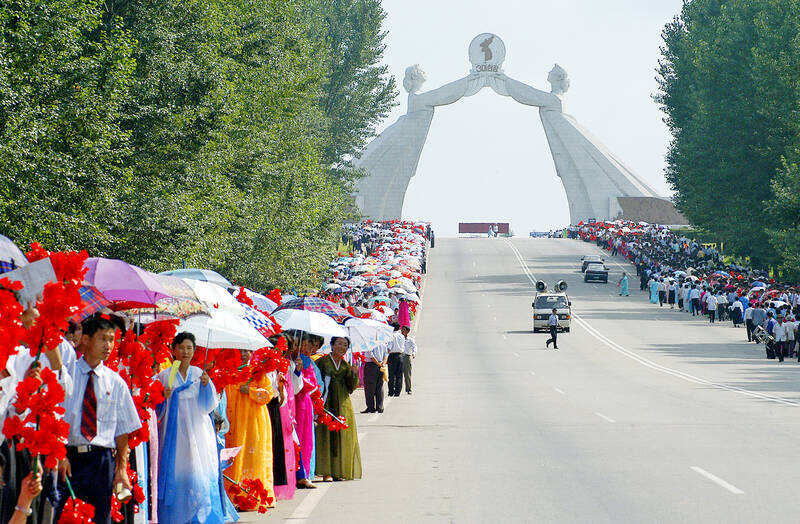North Korea has demolished a monument that symbolized hope for reconciliation with the South, days after North Korean leader Kim Jong-un said that the peaceful reunification of the two Koreas was no longer possible.
In the latest sign of rising tensions on the peninsula, the Arch of Reunification — built in 2000 after a landmark inter-Korean summit — has disappeared from satellite imagery, the NK News Web site reported.
It was not immediately clear when or how it had been taken down, NK News said.

Photo: Reuters
Kim, whose tone has become markedly belligerent in the past few weeks, described the concrete arch — which shows two women, one each from the North and South, holding an emblem of the outline of the Korean Peninsula — as an “eyesore” at a speech this month to the Supreme People’s Assembly, the North’s rubber-stamp parliament.
He added that North Korea’s constitution should be amended to reflect South Korea’s new status as his country’s “principal enemy” — effectively ending decades of official policy that stressed the eventual reunification the countries.
The 30m arch, formally known as the Monument to the Three Charters for National Reunification, symbolized self-reliance, peace and national cooperation, South Korean government records showed.
Located on Reunification Highway, which connects Pyongyang to the heavily armed border with South Korea, it was reportedly erected to commemorate plans for reunification put forward by Kim’s grandfather and North Korean founder Kim Il-sung.
While purely symbolic, its reported removal would add to fears that North Korea has taken a more provocative course in its relations with the South and its allies, months before the US presidential elections.
The regime claimed it had launched its first spy satellite in November last year, and last week said it had test-fired a new ballistic missile tipped with a hypersonic maneuverable warhead.
South Korea’s military yesterday said the North had launched several cruise missiles into the sea, a fortnight after it fired artillery rounds near the countries’ disputed maritime border.
“We’re watching this very, very closely,” US National Security Council Coordinator for Strategic Communications John Kirby said, when asked if the provocative tone of recent North Korean announcements — including one in which it said it was “preparing for nuclear war” — was cause for concern.
“I would just tell you that we remain confident that the defensive posture that we’re maintaining on the peninsula is appropriate to the risk,” he added.
There is little prospect of a return to the era of cross-border rapprochement symbolized by the monument.
South Korean President Yoon Suk-yeol has taken a harder line against Pyongyang, vowing immediate and tough responses to North Korean provocations.
In response, the North has vowed to “wipe out” its neighbor if attacked by South Korean and US forces.
Late last year, Pyongyang said that a 2018 agreement with the South designed to de-escalate military tensions was no longer valid.
The North Korean Supreme People’s Assembly last week abolished government agencies that had overseen engagement with the South.
Additional reporting by Reuters

‘SHORTSIGHTED’: Using aid as leverage is punitive, would not be regarded well among Pacific Island nations and would further open the door for China, an academic said New Zealand has suspended millions of dollars in budget funding to the Cook Islands, it said yesterday, as the relationship between the two constitutionally linked countries continues to deteriorate amid the island group’s deepening ties with China. A spokesperson for New Zealand Minister of Foreign Affairs Winston Peters said in a statement that New Zealand early this month decided to suspend payment of NZ$18.2 million (US$11 million) in core sector support funding for this year and next year as it “relies on a high trust bilateral relationship.” New Zealand and Australia have become increasingly cautious about China’s growing presence in the Pacific

The team behind the long-awaited Vera Rubin Observatory in Chile yesterday published their first images, revealing breathtaking views of star-forming regions as well as distant galaxies. More than two decades in the making, the giant US-funded telescope sits perched at the summit of Cerro Pachon in central Chile, where dark skies and dry air provide ideal conditions for observing the cosmos. One of the debut images is a composite of 678 exposures taken over just seven hours, capturing the Trifid Nebula and the Lagoon Nebula — both several thousand light-years from Earth — glowing in vivid pinks against orange-red backdrops. The new image

ESPIONAGE: The British government’s decision on the proposed embassy hinges on the security of underground data cables, a former diplomat has said A US intervention over China’s proposed new embassy in London has thrown a potential resolution “up in the air,” campaigners have said, amid concerns over the site’s proximity to a sensitive hub of critical communication cables. The furor over a new “super-embassy” on the edge of London’s financial district was reignited last week when the White House said it was “deeply concerned” over potential Chinese access to “the sensitive communications of one of our closest allies.” The Dutch parliament has also raised concerns about Beijing’s ideal location of Royal Mint Court, on the edge of the City of London, which has so

Canada and the EU on Monday signed a defense and security pact as the transatlantic partners seek to better confront Russia, with worries over Washington’s reliability under US President Donald Trump. The deal was announced after a summit in Brussels between Canadian Prime Minister Mark Carney and European Commission President Ursula von der Leyen and European Council President Antonio Costa. “While NATO remains the cornerstone of our collective defense, this partnership will allow us to strengthen our preparedness ... to invest more and to invest smarter,” Costa told a news conference. “It opens new opportunities for companies on both sides of the